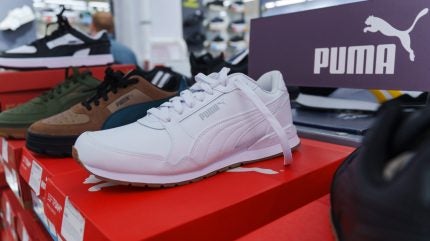
Puma expects a low double-digit percentage decline in full-year 2025 sales on a currency-adjusted basis, alongside a reported loss in earnings before interest and taxation (EBIT), with capital expenditure planned at around €250m.
In the third quarter (Q3) of 2025, sales fell 10.4% on a currency-adjusted basis to €1.95bn. Currency movements, notably those of the US dollar and the Argentine peso, reduced revenue by €125m, pushing reported sales down 15.3%.

Discover B2B Marketing That Performs
Combine business intelligence and editorial excellence to reach engaged professionals across 36 leading media platforms.
The German sportswear brand’s wholesale revenue dropped 15.4% to €1.38bn. Direct-to-consumer (DTC) sales rose 4.5% to €570m, driven by a 5.6% increase in e-commerce.
Sales in owned and operated stores were up 3.9%. The DTC share increased to 29.1% from 25.1% in Q3 2024.
In Q3 2025, Puma implemented measures to strengthen its base for 2026 and beyond, cutting lower-quality wholesale business, reducing excess inventory at retail partners, and scaling back promotions in e-commerce and full-price DTC stores.
The reset drove a broad sales decline across all regions. In the Americas, revenue fell 15.2% to €678.1m, with a modest dip in Latin America and the bulk of the decrease stemming from North America.

US Tariffs are shifting - will you react or anticipate?
Don’t let policy changes catch you off guard. Stay proactive with real-time data and expert analysis.
By GlobalDataAsia Pacific sales decreased 9% to €367.1m, reflecting a sharp drop in Greater China’s wholesale performance due to reset actions, partly offset by DTC growth. Revenue in the Europe and Middle East region declined 7.1% to €910.6m, largely due to weaker wholesale in Europe.
All product categories were affected by the strategic reset. Footwear sales declined 9.9% to €1.04bn, while apparel revenue fell 12.8% to €635.5m, weighed by a downturn in Sportstyle – Puma’s largest category.
Gross margin contracted by 260 basis points to 45.2% from 47.9% a year earlier. Operating expenses, excluding one-off costs, decreased 2.6% to €850.6m from €873.4m, reflecting benefits from the cost efficiency programme.
Adjusted EBIT, excluding one-time costs, dropped to €39.5m from €237m in Q3 2024 due to lower sales and margin pressure.
One-time costs linked to the efficiency programme totalled €10.1m during the quarter. Reported EBIT was €29.4m, down from €237m a year earlier, with a reported EBIT margin of 1.5% compared with 10.3% in Q3 2024.
The financial result improved 6.3% to negative €43.8 million from negative €46.7 million.
Puma recorded a net loss of €62.3m for the quarter, versus net income of €127.8m in the same period of the previous year.
Arthur Hoeld, CEO of Puma, stated: “At the end of July, we stated that 2025 would be a year of reset. Since then, we have taken important steps to clean up Puma’s distribution, improve our cash management and reset our operational expenses. By expanding our cost efficiency programme, we are moving quickly to address challenges and make the business more efficient and resilient. With third-quarter results meeting our expectations, we remain committed to executing these measures with discipline.
“With these strategic priorities, we have the clear ambition to establish Puma as a Top 3 sports brand globally, returning to above industry growth and generating healthy profits in the medium term.”





